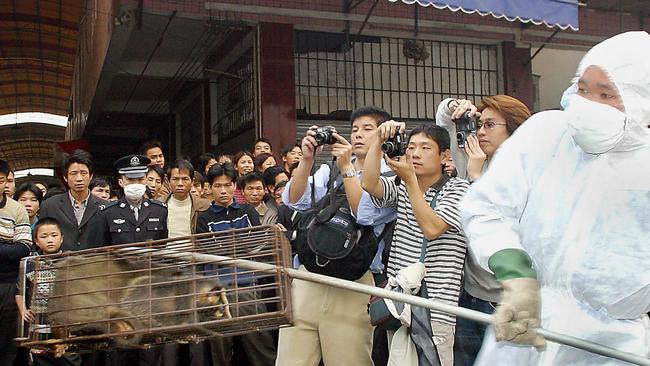Coronavirus: China offers breaks for export of banned wild animals
China is offering tax breaks for the export of wild animals the trade of which are banned domestically because of COVID-19.

Chinese authorities have shut down domestic wild animal traders on fears their goods sparked the coronavirus pandemic. Now officials are offering tax incentives to the multi-billion-dollar animal-products industry to ship some of the creatures overseas, according to Chinese government documents.
China’s National People’s Congress on February 24 imposed a ban on the sale and consumption of wild animals in the country. “The prominent problem of recklessly eating wild animals and its potential risk to public health have aroused wide public concern,” a spokesman told state media.
Less than a month later, China’s Finance Ministry and tax authority said on March 17 they would raise value-added tax rebates on nearly 1500 Chinese products, including offering a 9 per cent rebate on the export of animal products such as edible snakes and turtles, primate meat, beaver and civet musk, and rhino horns, a government document shows.
China’s economy is struggling amid a sharp global downturn and a prolonged trade war with the US. Beijing’s new tax incentives are tied to a broad array of exports, designed to support Chinese industries from steel and construction to agricultural products, according to a report by the US Congressional Research Service. But the move to encourage wild animal sales abroad, while banned at home, “could spread the risk to global markets,” the report says.
China is also a major exporter of medicines and medical equipment, but the new tax incentives made no mention of goods in short supply during the global pandemic, including personal protective equipment for medical workers and first responders.
“Absent in China’s policy push are incentives to encourage the sale of pharmaceuticals, PPE and other medical products overseas,” the report says. Many countries, including China and the US, have export restrictions on medical equipment exports because of global shortages.
China’s exports of wild animals and animal parts are minuscule compared with the vast volumes of goods China ships abroad.
China’s live reptile exports — which are almost entirely edible reptiles — go primarily to Vietnam, with more than $US1m worth of sales in total during January and February this year, according to China Customs statistics tabulated by Trade Data Monitor.
South Korea, Japan, Hong Kong and Indonesia were the next-largest importers of China’s reptiles, though at much smaller volumes, with South Korea importing more than $US122,000 in reptiles and the other countries less than $US100,000 during the first two months of 2020.
And yet even small amounts of exports could pose a risk, should wild animals prove to be the source of pandemics, as some Chinese reports suggest. The US was the biggest importer of China’s animal products used in pharmaceuticals, such as civet and beaver, buying about $US865,000 worth over January and February 2020.
Taiwan was the second-largest importer of the products, buying about $US126,000 worth over the same period; South Korea and Hong Kong followed, each buying about $US70,000 worth.
The exotic animal trade fuels the multi-billion-dollar traditional Chinese medicine industry, in which products made from rhino horns and tiger bones are used to treat ailments. Many scientific studies have found no medicinal properties in either. Beijing has promoted the use of traditional Chinese medicine in treating coronavirus patients.
There is also a long tradition in China of eating wildlife, especially in the southern regions of Guangdong and Guangxi, a practice that has long been the target of criticism by animal rights activists.
Worldwide, 1,848,503 people had been infected by the virus, which causes the disease COVID-19, as of Monday. The data compiled by Johns Hopkins University reported there had been 114,215 deaths from the virus, which first emerged in Wuhan, China.
Although health authorities have yet to identify the precise cause of the outbreak, a study by the Wuhan Institute of Virology, based on patient samples, found a 96 per cent genetic match with a bat coronavirus. Another Chinese study suggested snakes sold in a Wuhan market were the source.
Researchers have said the 2002 outbreak of severe acute respiratory syndrome originated in bats and spread to humans via palm civets sold in China’s open-air food markets. China banned all wildlife trade in 2003, when Hong Kong researchers identified civets as a potential source of SARS, which killed about 800 people. It lifted the ban later that year on 54 species — including civets — that it said could be bred in licensed farms, subject to sanitation checks.
The Wall Street Journal



To join the conversation, please log in. Don't have an account? Register
Join the conversation, you are commenting as Logout